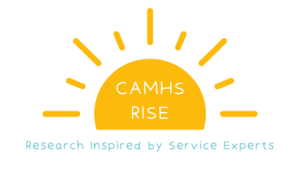Recent research has revealed the extent of the mental health crisis affecting children and young people in the UK. Our researchers have been working with young people to shape the research which could help services address the crisis.

Government research shows that approximately one in six children and young people identify as having a probable mental health condition and that this was made worse by the Covid-19 pandemic. Evidence suggests that self-harm has increased among young people in England and identifies suicide as one of the leading causes of death. Research also shows that poor mental health has a negative impact on both the child or young person and their parents/carers and family and can adversely affect educational success and life chances.
Our researchers worked with young people who have received care from Child and Adolescent Mental Health Services (CAMHS), the NHS services that assess and treat young people with emotional, behavioural or mental health difficulties, to identify the research questions which could help to shape future research and provide the most appropriate help and support and improve services.
“Is there a link between waiting time and admissions?”
The project, a research collaboration with Devon Partnership NHS Trust and the National Institute for Health Research Clinical Research Network South West, is called Child and Adolescent Mental Health Services Research Inspired by Service Experts (CAMHS RISE). It was inspired by a young service user asking about a link between CAMHS waiting times and inpatient admissions. To find an answer a trainee Clinical Psychologist carried out a literature review and service evaluation, the results from which will be available soon.
Now the collaborative research project, part of the Peninsula Mental Health Research Initiative, hopes to develop an infrastructure to improve this process, making it possible for questions like this, generated by service users, parents, carers, and staff, to be shared with researchers. Researchers will then be able to use them to develop bids for research funding as well as store them for use by clinical trainee psychologists to evaluate CAMHS services.
Generating research questions
The initial research questions are being generated in workshops with young people, parents and carers through surveys of health and social care professionals, before young people with experience of CAMHS prioritise the questions most important to them.
Senior Research Fellow Dr Gretchen Bjornstad said: “These questions will help us to develop new research that is relevant and important to the people who know the service best and in the longer term could help to improve services.”
Our Evidence Synthesis Team have already carried out rapid evidence reviews for the questions ranked as most important by young people. These have been used to produce plain language summaries to identify what and how much is already known including any relevant ongoing research.
“These summaries will provide a way to give something back to the young people”
Dr Gretchen Bjornstad said: ‘These summaries will provide a way to give something back to the young people who have been involved in our project before the results of any research that comes out of their questions can be felt, demonstrating, importantly, that they have been heard.’
Senior Research Fellow Dr Rachel Hayes said: ‘It was fascinating just how much the young people understood about research and how invested they were in improving both their own care and those of people to come after them. It was also interesting that the questions young people asked were often very similar to those their parents asked. We are hopeful that something similar will soon be set up in Cornwall CAMHS.’
Researcher Kitty Parker said: ‘It was interesting to see the variation, highlighted by the lack of evidence for some questions, between the areas that young people and parents thought most important and what researchers or CAMHS practitioners might think were important. Young people’s questions focused on finding information for marginalised and underrepresented groups in research, really illustrating the benefits of this project’.
Visit the CAMHS RISE project page to find out which questions have been prioritised and read the evidence summaries and look out for the paper expected later in the year.
***
Dr Gretchen Bjornstad will be talking about her work for the third webinar in the upcoming NIHR ARCs national webinars on mental health series.
Register here for ‘Young people’s mental health’
Wednesday 12 July
1pm-2pm.
***
